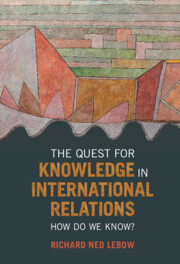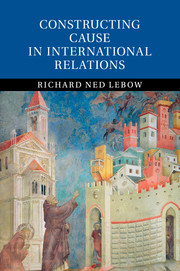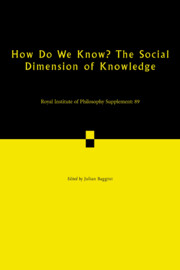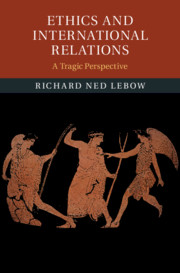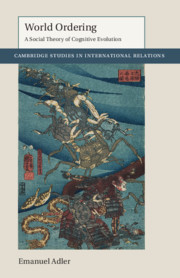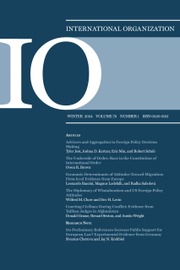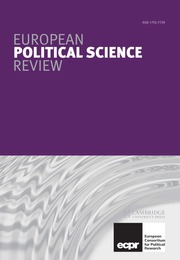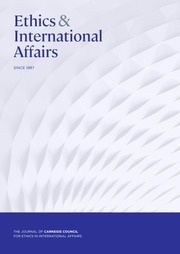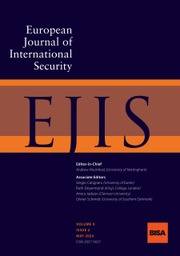The Quest for Knowledge in International Relations
How Do We Know?
£69.99
- Author: Richard Ned Lebow, Dartmouth College, New Hampshire
- Date Published: April 2022
- availability: Available
- format: Hardback
- isbn: 9781009098922
£
69.99
Hardback
Other available formats:
Paperback, eBook
Looking for an inspection copy?
This title is not currently available on inspection
-
What do we mean by theory in international relations? What kinds of knowledge do theories seek? How do they stipulate it is found? How should we evaluate any resulting knowledge claims? What do answers to these questions tell us about the theory project in IR, and in the social sciences more generally? Lebow explores these questions in a critical evaluation of the positivist and interpretivist epistemologies. He identifies tensions and problems specific to each epistemology, and some shared by both, and suggests possible responses. By exploring the relationship between the foundations of theories and the empirical assumptions they encode, Lebow's analysis enables readers to examine in greater depth the different approaches to theory and their related research strategies. This book will be of interest to students and scholars of international relations theory and philosophy of social science.
Read more- Explores underlying assumptions made by positivists and interpretivists about the nature of the world and how we obtain knowledge about it
- Highlights the subjective nature of the concepts of cause and reason, and their implications for argument, research, and inference
- Explores tensions and problems in making knowledge claims in different epistemologies and research programs
Reviews & endorsements
'Lebow offers an impressively grand tour of important debates and distinctions in IR, seasoned with his own eyewitness accounts as a participant in many of the discussions he surveys. He also doubles down on the the project of defining and pulling together a relatively coherent 'interpretivist' approach to juxtapose to a 'positivist' canon. Does the campaign succeed? Read the book and judge for yourself!' Patrick Thaddeus Jackson, American University
See more reviews'Ned Lebow's Quest for Knowledge asks what scholars can come to know about international relations. Lebow provides a powerful argument advancing his highly-nuanced interpretivist-reflectivist methodology. At the same time, Quest surveys the range of current methodological approaches, highlighting the strengths and weaknesses of each, including his own version of interpretivism. Methodology is, as Lebow rightly observes, only the tip of an iceberg, in that each approach is built upon a complex of metaphysical and epistemological premises - premises that the book makes explicit. Quest for Knowledge is another superb scholarly work by Lebow, and is essential reading for anyone interested in the legitimacy of various social science methods.' Fred Chernoff, Harvey Picker Professor of International Relations, Colgate University
Customer reviews
Not yet reviewed
Be the first to review
Review was not posted due to profanity
×Product details
- Date Published: April 2022
- format: Hardback
- isbn: 9781009098922
- length: 320 pages
- dimensions: 235 x 157 x 19 mm
- weight: 0.508kg
- availability: Available
Table of Contents
Preface
1. Introduction
2. What is knowledge?
3. Positivism and interpretivism
4. Positivism: Correlational research
5. Positivism: Experiments
6. Positivism: Rationalism
7. Interpretivism: Causal narratives
8. Interpretivism: Practice turn
9. Counterfactuals
10. Verification vs. Falsification
11. Causal and non-causal narratives
12. Reason
13. Cause
14. The causal paradox
15. Mechanisms
16. International relations as an ethical practice.
Sorry, this resource is locked
Please register or sign in to request access. If you are having problems accessing these resources please email [email protected]
Register Sign in» Proceed
You are now leaving the Cambridge University Press website. Your eBook purchase and download will be completed by our partner www.ebooks.com. Please see the permission section of the www.ebooks.com catalogue page for details of the print & copy limits on our eBooks.
Continue ×Are you sure you want to delete your account?
This cannot be undone.
Thank you for your feedback which will help us improve our service.
If you requested a response, we will make sure to get back to you shortly.
×
